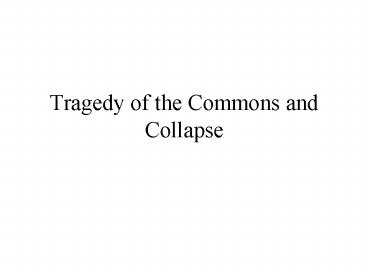Tragedy of the Commons and Collapse - PowerPoint PPT Presentation
1 / 43
Title:
Tragedy of the Commons and Collapse
Description:
Tragedy of the Commons and Collapse. COMMONS ... Moia - Easter Island ... once prosperous and noble people of Easter Island were protagonists in one of ... – PowerPoint PPT presentation
Number of Views:376
Avg rating:3.0/5.0
Title: Tragedy of the Commons and Collapse
1
Tragedy of the Commons and Collapse
2
COMMONS Resources that are needed by all but
whose productivity is diffuse rather than
concentrated, low or unpredictable in yield, and
low in unit value tend to be kept as communal
property. Netting, (1982)
3
That which is common to the greatest number has
the least care bestowed upon it. Aristot
le
4
Carrying Capacity The maximum number of animals
that a habitat will support without degradation
of the resource base.
5
(No Transcript)
6
(No Transcript)
7
Moia - Easter Island
8
The most nagging question is how could these
people not have foreseen what was happing and
changed their course of action. The once
prosperous and noble people of Easter Island were
protagonists in one of the most total
environmental and social breakdowns recorded in
history, yet they appear to have been unable to
reverse their fall. Redman, C. (1999)
9
(No Transcript)
10
(No Transcript)
11
(No Transcript)
12
(No Transcript)
13
(No Transcript)
14
(No Transcript)
15
- Ruin is the destination towards which all
men rush, each pursuing his own best interest in
a society that believes in the freedom of the
commons. Freedom in a commons brings ruin to all. -
Hardin, 1968 -
16
The most nagging question is how could these
people not have foreseen what was happing and
changed their course of action. The once
prosperous and noble people of Easter Island were
protagonists in one of the most total
environmental and social breakdowns recorded in
history, yet they appear to have been unable to
reverse their fall. Redman, C. (1999)
17
Directions for solving commons (and other)
environmental problems 1. Harness individual
and corporate self-interest through market
incentives 2. Improve environmental management
through scientific discovery and public policy
formulation
18
Man is self-interested. This self-interest may be
enlightened to the extent that people are capable
of setting aside their own well-being for close
relatives and friends. But beyond this, good
intentions will not suffice to produce good
results. Developing an environmental ethic may be
desirable, but it is unlikely to change basic
human nature. Instead of intentions, good
resource stewardship depends on how well social
institutions harness self-interest through
individual incentives. Free Market
Environmentalism (1991)
19
- Three possible solutions to the Tragedy of the
Commons - Privatize commons resources free-market
environmentalism - Improve public management of commons resources
- 3. Change human nature
20
Through wanton destruction and profligate waste
the earth is fast becoming an unfit home for its
noblest inhabitant. Another era of human
improvidence will reduce it to such a condition
of impoverished productiveness, of shattered
surface, of climatic excess as to threaten the
depravation, barbarism and extinction of our
species!! G.P. Marsh, (1864), Man and Nature
21
Collapse drastic decrease in human population
and socioeconomic complexity over a wide area for
an extended period of time
22
(No Transcript)
23
(No Transcript)
24
(No Transcript)
25
(No Transcript)
26
(No Transcript)
27
(No Transcript)
28
Four principal factors associated with collapse
(Diamond, 2005) 1. Environmental degradation
(usually linked to population growth or
unsustainable land uses) 2. Regional climate
change 3. Interactions with neighbors (friendly
or hostile) 4. Societys response to
environmental problems - all collapses
included this causal factor
29
The most nagging question is how could these
people not have foreseen what was happing and
changed their course of action. The once
prosperous and noble people of Easter Island were
protagonists in one of the most total
environmental and social breakdowns recorded in
history, yet they appear to have been unable to
reverse their fall. Redman, C. (1999)
30
- Three possible solutions to the Tragedy of the
Commons - Privatize commons resources free-market
environmentalism - Improve public management of commons resources
- 3. Change human nature
31
Maximum Sustainable Yield the highest rate at
which a potentially renewable resource can be
harvested indefinitely without reducing its
available supply.
32
(No Transcript)
33
The appearance of environmental management
created through the establishment of governmental
agencies, and the aura of coherent policy by
issuance of decrees prohibiting entry to -- and
harvesting from -- state property, has led to
continued degradation of resources under the
tolerant eye of government agencies.
Unfortunately, most state property regimes are
examples of the states reach exceeding its
grasp. Many states have taken on far more
resource management authority than they can be
expected to carry out effectively. D.W.
Bromley, (1989), The Management of Common
Property Natural Resources
34
(No Transcript)
35
(No Transcript)
36
Maximum Sustainable Yield the highest rate at
which a potentially renewable resource can be
harvested indefinitely without reducing its
available supply.
37
(No Transcript)
38
(No Transcript)
39
(No Transcript)
40
(No Transcript)
41
We see the tragedy of the commons not as a defect
in the concept of commons but as a result of
the disastrous transition period between the loss
of an effective bioethic and its replacement by a
new bioethic that could once again bring
biological realities and human values into a
viable balance.
42
Conservation may be a sign of personal virtue,
but it is not a sufficient basis for a sound,
comprehensive energy policy. Dick Cheney,
New York Times (May 1, 2001)
43
(No Transcript)































